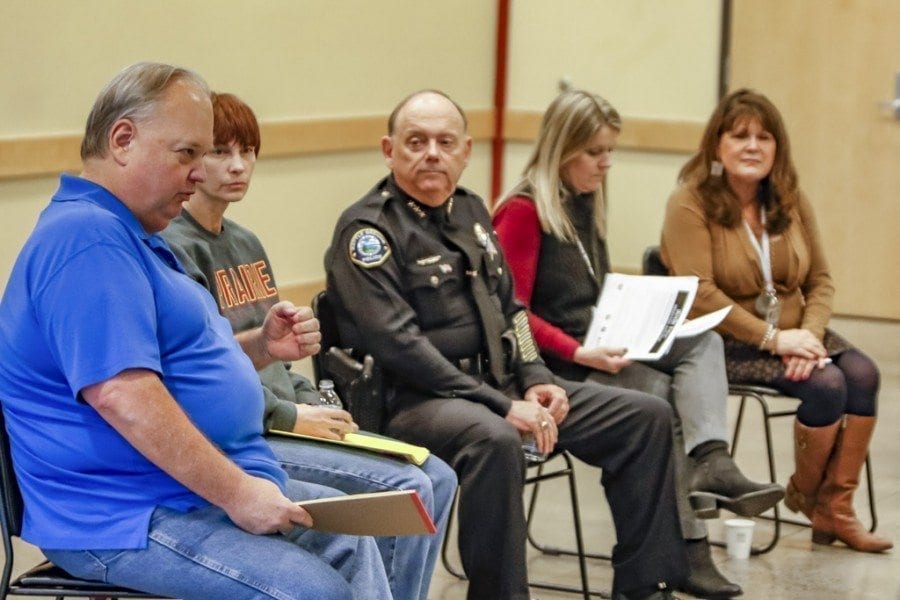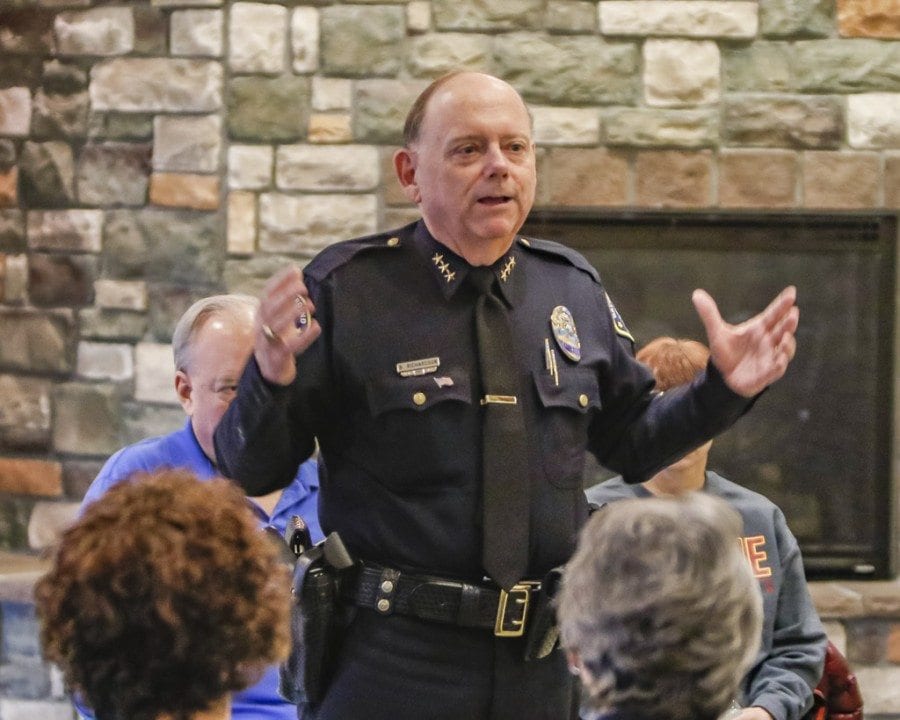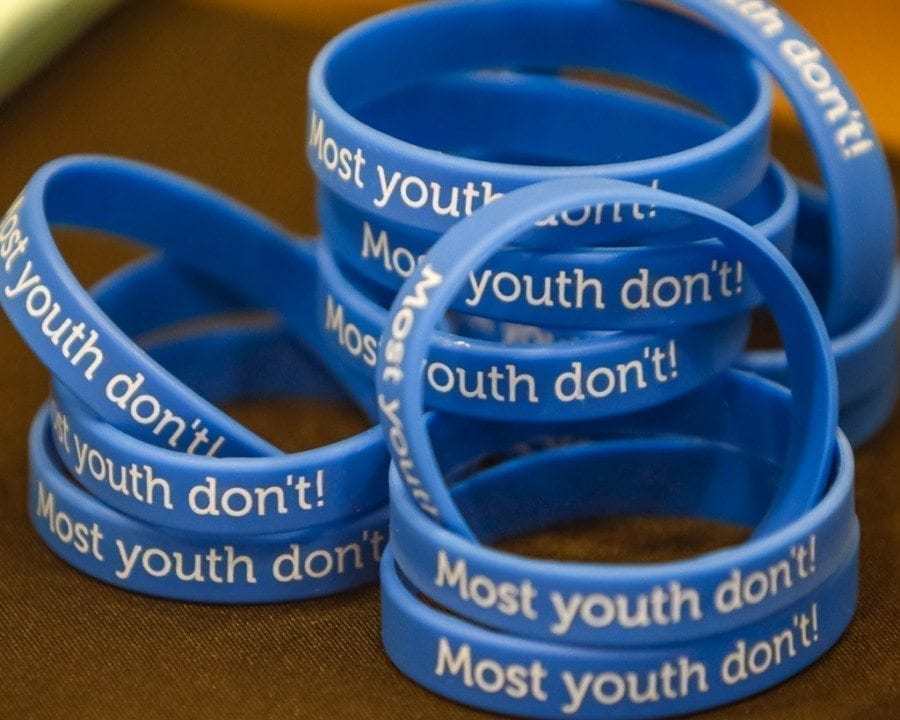BATTLE GROUND — As Battle Ground Police Chief Bob Richardson kicked off one of the city’s “Coffee with the Chief” events on Wednesday evening, he gave a quick disclaimer regarding the topic of the evening — how the legalization of marijuana has impacted the Battle Ground community.
“This is not a conversation about whether marijuana should be legal or not,” Richardson told the roughly 30 community members who attended the event. “When I first started in police work, we threw people in jail if they had any marijuana on them. The biggest concerns and issues with marijuana in our society now are access to minors and people operating motor vehicles.”
The evening’s discussion, which took place in the Battle Ground Community Center, included a panel of four experts who joined Richardson at the front of the room to discuss the impact of marijuana on the community and specifically youth in the community. The panel included Loren Carlson, owner of County Cannabis Store in Battle Ground; Joy Lyons, prevention coordinator for Educational Service District (ESD) 112; Sharice Lee, intervention specialist at Prairie High School; and Kathy Deschner, coalition coordinator for Prevent Together: Battle Ground Prevention Alliance.

Loren Carlson, owner of Country Cannabis Store, introduced himself first and talked about the marijuana industry being one of the most highly regulated, if not the most regulated, industry in the state and the country. He gave out a few facts about the marijuana industry, including that marijuana sales brought in $259 million in revenue to the state in 2015, jumping up to $972 million in 2016. He said the state received $64 million in taxes from marijuana sales in 2015; that number jumped to $185 million in 2016.
Carlson said the state has millions of dollars of that tax money earmarked for youth drug prevention.
“We (in the marijuana industry) feel like we’re doing our part to put money back in the community,” Carlson said.
Carlson then outlined the different ways that he and his employees at Country Cannabis work to ensure that no underage people are ever able to enter the store and purchase marijuana.
“If you’re a minor and want to come into the Country Cannabis Store, there’s a corral right when you walk in and you are checked for ID right there before even getting to the main part of the store,” Carlson said. “If you’re 58 or 75, you will get IDed. If you’re 75 and you don’t have your ID on you, you won’t be allowed in. We have 26 cameras onsite. If you’re a minor outside the store asking someone to buy weed for you, we will ask you to leave and if you don’t, you will be removed.”
Carlson also said that the store has went through six different compliance checks (when an officer sends in a minor to try and enter the store and purchase marijuana) and they have passed all of them.
Joy Lyons, prevention coordinator for ESD 112, discussed the shift in prevention that occurred in her department when the law was passed that made recreational marijuana legal in the state. She said the goal has been to create programs and strategies and create systems that aim to educate youth instead of simply telling them “don’t do it.”
Lyons talked about a “We Can Wait” campaign, which encourages youth to think of all the reasons they can wait until they are 21 to use marijuana.
“We’ve found that kids get most of their information from social media,” Lyons said. “We are working on what we can do to educate them, we try to educate without saying ‘don’t do it.’ We have the Healthy Youth Survey coming up soon, and we are hopeful we might see some of the numbers (in regards to use) go down on that.”
Sharice Lee, intervention specialist at Prairie High School, said she talks to kids often who are struggling with drugs or addictions and she said she always asks where they got the substance from.
“I have never had any student tell me, ‘I was able to get it at the store,’ it’s always through other people,” Lee said. “I’ve seen the district (Battle Ground School District) and our community go through legalization. Whenever something becomes legal, kids start thinking that it must not be that bad because it’s legal, so perception of harm goes down. I have seen an increase in kids getting caught with marijuana at school, and we have been seeing more of the retail stuff showing up. Like alcohol, there’s always going to be a way to get it.”

Lee said they have really been working with the kids at the schools to educate them, and that their approach has been different since the legalization of marijuana.
“Our main concern is keeping the kids safe,” Lee said. “We talk with the kids a lot about why the legal age to use marijuana is 21, because their brains are still not fully developed as teenagers, and they are more subject to the damage/effects of it. We ask the kids, ‘if you use marijuana, how is that going to affect you in a different way than an adult?’ They will experience the negative effects in a stronger way.”
Lee also talked about the shift in suspensions related to marijuana. Instead of suspending kids for getting caught with marijuana and keeping them at home where they will have nothing to do, she said school officials are focusing more on doing in-school suspensions and keeping kids in school.
Kathy Deschner, coalition coordinator for Prevent Together: Battle Ground Prevention Alliance, said she has been involved with prevention since about 2002, and “can’t imagine a more important job.”
“We make every dollar we receive for prevention go as far as we can,” Deschner said. “The coalition is really focused on helping people understand the impact and harm of drugs. Marijuana is much different now than it was years ago. Our primary focus is awareness.”

Since the Battle Ground Prevent organization is still fairly new, Deschner said they’re just really getting started with everything they want to do. She said they are working closely with other community members to provide more youth social activities, such as Underage Drinking Town Hall events and more. The coalition also has a D.R.E.A.M. Team made up of area youth who work to raise awareness about prevention.
At the end of the evening, Richardson thanked the panel and also all of the community members who attended.
“We may not be rich in wealth, but our community is rich in heart,” Richardson said.
Coffee with the Chief events are something that the city of Battle Ground started last year. Community members can attend and hear about different topics of concern in the community and hear from a panel of experts. Richardson said they are hoping to hold the Coffee with the Chief events about four times a year.
To find out when there are upcoming Coffee with the Chief events, visit the city of Battle Ground Facebook page or visit the city’s website.




